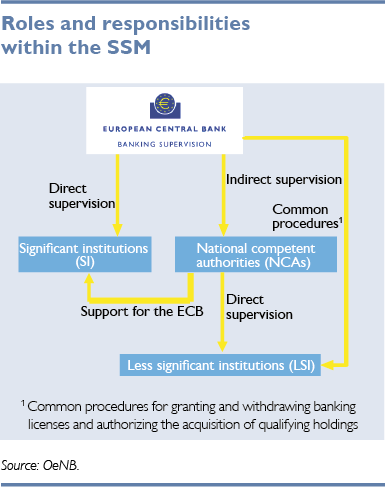Single Supervisory Mechanism
The Single Supervisory Mechanism (SSM), the system of banking supervision in the euro area, became fully operational on November 4, 2014. It is legally based on the SSM Regulation, which is complemented by the SSM Framework Regulation adopted by the ECB. Together with the Single Resolution Mechanism (SRM) for banks and the European Deposit Insurance Scheme (EDIS), the SSM is one of the three pillars of the European banking union. Under the SSM, the ECB is responsible for the supervision of banks in the euro area. Non-euro area EU countries may participate in the SSM on a voluntary basis through close cooperation between the competent supervisory authorities. Reflecting the decentralized organization of supervision under the SSM, the ECB and the national supervisory authorities have different tasks and responsibilities.
The division of supervisory tasks depends on whether a supervised bank is deemed a "significant institution" or a "less significant institution." To determine whether a bank is significant or not, the ECB conducts reviews at least at annual intervals, assessing the size of a bank, its economic relevance and the scope of its cross-border activities. Significant banks are supervised directly by the ECB, which puts together joint supervisory teams (JSTs), consisting of staff of the ECB and the national competent authorities (NCAs; in the case of Austria, the FMA and the OeNB).
Less significant banks are supervised, as a rule, by the NCAs, in line with the principle of proportionality. This means that the intensity of supervision and the scope of NCA action and reporting to the ECB depend on the systemic relevance and risk profile of a given bank. Concerning the division of tasks between the FMA and the OeNB, the FMA is the designated public authority responsible for decision making, whereas the OeNB is responsible for performing off-site analyses and on-site inspections (referred to as “fact finding”); this supervisory regime applies to close to 500 less significant banks operating in Austria. To ensure a uniform approach to banking supervision and high supervisory standards, NCA supervision of the less significant institutions is subject to the overall oversight of the ECB.

The ultimate decision-making body on SSM planning and action is the Governing Council of the ECB in its SSM composition, which acts on the basis of draft decisions prepared by the SSM Supervisory Board. The decision-making process is based on a “non-objection” procedure. If the Governing Council does not object to a draft decision proposed by the Supervisory Board within a defined period of time that may not exceed ten working days, the decision is deemed adopted.
The Supervisory Board is composed of the Chair and Vice-Chair, four ECB representatives and one representative of the NCAs in each participating EU country. The Austrian representatives are Helmut Ettl, member of the Executive Board of the FMA, and – in a nonvoting capacity – Andreas Ittner, Vice Governor of the OeNB. The Austrian representative in the Governing Council of the ECB is OeNB Governor Ewald Nowotny.
